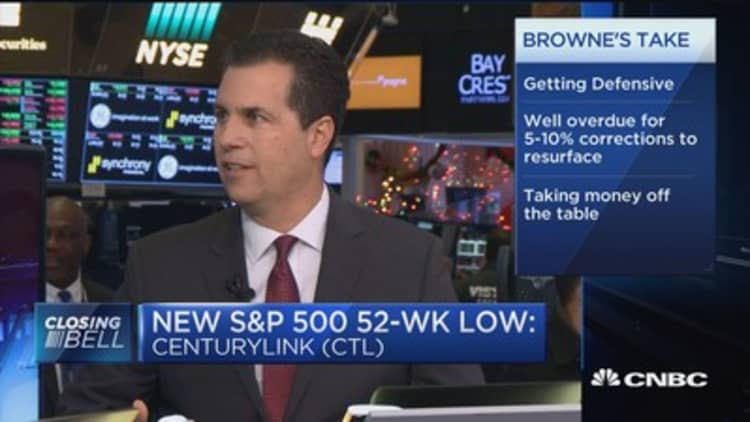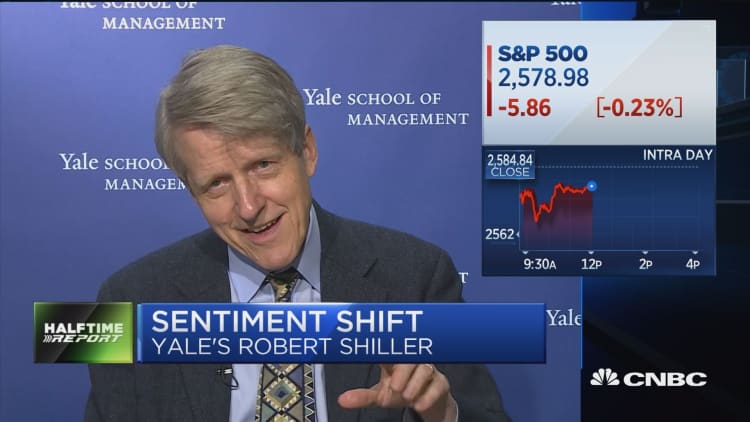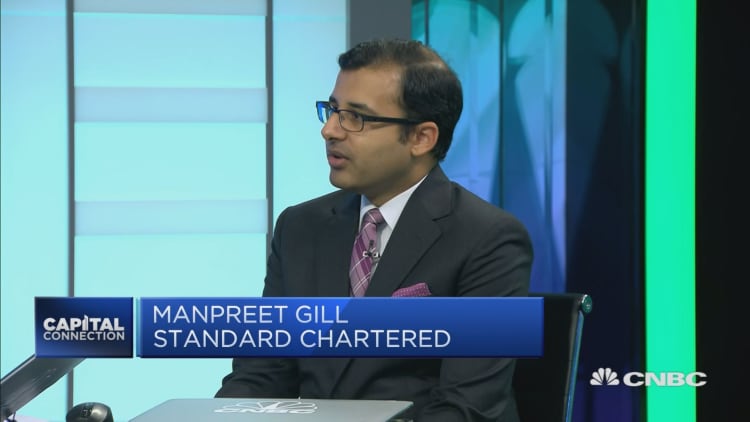Don't panic, but there is now a 70 percent chance of a U.S. stock market correction, according to research conducted by fund giant Vanguard Group. There is always the risk of a correction in stocks, but the Vanguard research shows that the current probability is 30 percent higher than what has been typical over the past six decades.
Vanguard, which manages roughly $5 trillion in assets and is a proponent of long-term investing, isn't sounding the alarm bells to scare investors out of the market. But according to Vanguard's chief economist Joe Davis, investors do need to be prepared for a significant downturn.
"It's about having reasonable expectations," Davis said of the research, which attempts to provide investors with a view of what can occur in the markets in the next five years. "Having a 10 percent negative return in the U.S. market in a calendar year [within a five-year forward period] has happened 40 percent of the time since 1960. That goes with the territory of being a stock investor." He added, "It's unreasonable to expect rates of returns, which exceeded our own bullish forecast from 2010, to continue."
In its annual economic and investing outlook published last week, Vanguard told investors to expect no better than 4 percent to 6 percent returns from stocks in the next five years, its least bullish outlook since the post-financial crisis recovery began.

Contributing to that outlook are market indicators that suggest "a little froth" in the market, according to the Vanguard chief economist.
"The risk premium, whether corporate bond spreads or the shape of yield curve, or earnings yields for stocks, have continued to compress," Davis said. "We're starting to see, for first time ... some measures of expected risk premiums compressed below areas where we think it can be associated with fair value."
Many market participants have worried in recent months about the flattening in the yield curve — the spread between 2-year note yields and 10-year yields — at the lowest level since before the financial crisis. Meanwhile, the spread between junk bond yields and Treasurys recently has moved closer to the level before the financial crash than the long-term historical average.
More from Global Investing Hot Spots:
Jack Bogle doesn't hate overseas investing as much as you think
The best market move to make next time North Korea tests a missile
China's stock market is booming again, but this time it's no bubble
For Vanguard the research is a chance to remind investors that overreaching is no better a solution for a lower-return environment than getting out of the market entirely. Davis worries some investors will hear "lower returns" and view it as a catalyst to become more aggressive as a way to generate the returns they have been used to in recent years.
As long as an investor is in a financial situation in which they can cope with a single down year, "you need to stay invested, because of lower expected returns," Davis said. But he added, "Don't become overly aggressive. The next five years will be challenging, and investors need to have their eyes wide open."
The next five years will be challenging, and investors need to have their eyes wide open.Joe DavisVanguard Group chief economist
For investors who have done well with a U.S.-centric stock portfolio, it's also past time to consider overseas equities. When international equities are added into a stock portfolio, the Vanguard research shows a drop to a 60 percent correction risk for a stock portfolio.
"It doesn't drive risk down to zero, but valuations are not neatly as stretched in other parts of the world," Davis said. Emerging markets stocks, which have roared in 2017, are highly correlated to U.S. stocks, and the Vanguard official said that would hold if U.S. stocks experience a downturn. "The real power is other developed markets," Davis said.
As part of its forecast that stocks will return no better than 4 percent to 6 percent in the coming years, Vanguard projected that developed markets stocks in the EAFE region will return more than U.S. stocks, at an estimated 5 percent to 7 percent, and emerging markets stocks possibly more, though with greater risk.
The Vanguard research also suggests that an allocation to bonds may prove more important in the coming years. "There is greater risk in the equity market than bond market," Davis said. "Our projections show that the downside risk in a portfolio with even a 20 percent investment-grade bond allocation is significantly lower."

Other major financial services firms are more cautious headed into 2018 as well, pointing to the length of the current bull market. Bank of America wrote in a recent note that the current bull market will be the longest in history if it continues to Aug. 22, 2018, while the outperformance of stocks vs. bonds, at seven years running, would be the longest streak since 1929.
Now in the ninth year of an economic recovery, Vanguard's chief economist said the position of the investor has flipped. Back in 2009 the economic outlook was poor but the investment outlook was very compelling. The progression through the economic recovery, although slow, now includes 80 percent of the world at full employment and an investment environment and outlook that is more muted.
"It's important to separate what is expected of the global economy from the price being paid for it. In the United States, stock prices have already been bid up based on future business expansion," Davis said.
Vanguard's economics team reviewed multiple stock valuation measures in coming to its conclusions, including Yale University professor Robert Shiller's CAPE ratio. "As markets rise and valuation on the Shiller has risen ... [it] doesn't mean we're in bubble territory, but we have deviated from where values should be," Davis said. Historically, low interest rates on bonds help explain why stock valuations have overshot corporate fundamental growth, but still can't justify the valuation levels.
Vanguard's bottom line is that the trade-off — the equity risk premium — between stocks and bonds, or even stocks and cash, will be lower going forward than it has been historically, and lower than what it has been in the past five years, specifically.
WATCH: Any market correction would likely come from external shock






